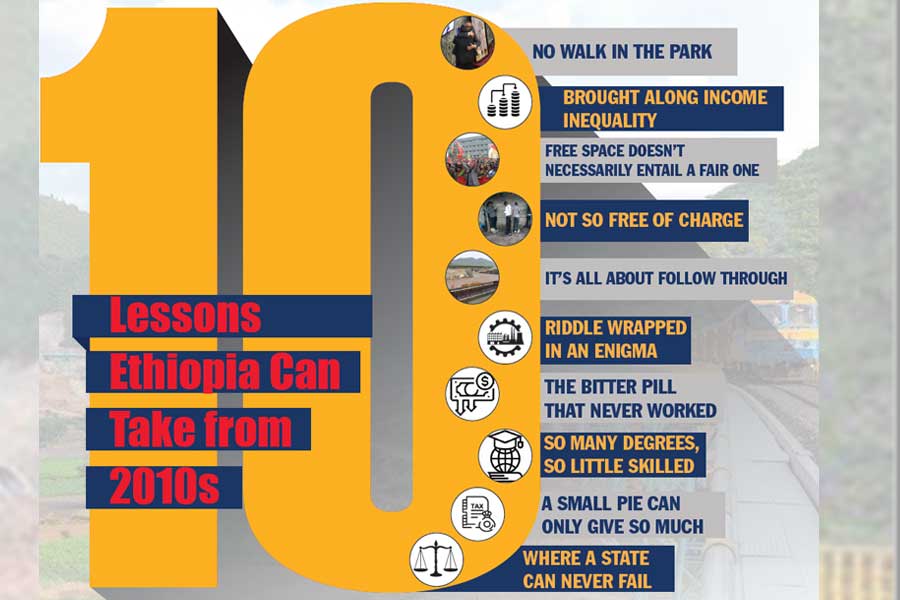
View From Arada | Jun 14,2025
Aug 1 , 2020
By BEMENET WONDEWOSSEN
The expired third round of the Community-Led Accelerated Water, Sanitation & Hygiene Project (COWASH) has been extended for an additional six months to improve Novel Coronavirus (COVID-19) emergency preparedness in five regional states.
The governments of Finland and Ethiopia have contributed 182 million Br for resilience building in Amhara, Benishangul Gumuz, Oromia, Tigray and Southern Nations, Nationalities, & Peoples' Region. The project is aimed at supporting the preparedness and response of the beneficiary regional states toward the pandemic. Ethiopia contributed 81.4 million Br, while the remaining will be covered by Finnish government.
The four-year project expired in June, and the fourth version was supposed to follow but was delayed due to the pandemic. The project will coincide with improving the WASH service in selected weredasthrough a community-managed project approach, where the community has power for planning, implementation, operation and maintenance of water supply facilities as well.
The support is primarily focused on advancing the accessibility of safe water and sanitation in areas with no access to clean water. Through this extension, 1,000 community and 400 school and health facility water points are expected to be built along with maintaining 1,000 school and health facility latrines. The project is set to create 1,500 hand washing facilities and involves the participation of 175,000 people in the project areas. It is expected to benefit 600,000 users.
Eight million Birr has been allocated as a response for an emergency procurement in COVID-19 treatment, isolation and quarantine centres and other COVID-19 hot spots in the project areas, which will go toward WASH-related items and services.
The project will focus on introducing intensive hand washing at all levels by building accessible hand washing facilities for homes, institutions and water points. It will also work on launching local soap production and the promotion of sustained behaviour change on hygienic practices. Under this scheme, 1,500 hand washing facilities will be built.
For the execution of the project, the community-led project will involve training 25,000 people over two days.
The people will be trained to educate the local community on how to use the built facilities without physical contact, how to protect themselves from the pandemic and what to do or follow if they show symptoms, according to Melaku Tekola, communications and knowledge management advisor for the project.
Beginning a quarter century ago, the project has been using a community development funding approach and was already implemented in the Amhara Regional State. Then nine years ago COWASH transitioned to a community-led approach where the community is involved in the construction, management and maintenance of the water points in 76 weredasacross five regional states.
"The community-led project gives a sense of ownership to the community," said Melaku, adding that it has helped COWASH achieve a 93pc success rate.
Before switching the approach, various research studies were conducted, according to Arto Suominen, COWASH's chief technical advisor.
"The research was detailed and well-grounded," he said. "It has helped us make evidence-based decisions for the project based on the assessments on the impacts and challenges."
The projects are in areas of political instability, and damage caused to the sites are becoming the primary challenge, according to Arto.
"The station in Welkayet is one example," he said.
Over the last nine years, after the new approach was implemented, the two countries have contributed 2.7 billion Br. Over half of the funds came from Finland. From the project, 4.2 million people benefited from water supply, while 4.1 million people were beneficiaries of health facilities. A total of 16,961 and 814,448 water and health facilities with latrines, respectively, were built.
While access to pure water is mandatory for survival, it is less accessible to rural areas that are far from getting clean water, according to Abebe Dinku (PhD), civil engineer and expert in water sanitation.
"A project like COWASH is even more important for a COVID-19 vulnerable population," Abebe said.
The fourth phase of COWASH, which will be launched in January 2021, targets 800,000 people as beneficiaries of upgraded safe water supply. Increasing latrine access to households from 42pc to 62pc is also the target of the fourth phase. Finland's government has already set aside 18.4 million euros for the third round.
PUBLISHED ON
Aug 01,2020 [ VOL
21 , NO
1057]

View From Arada | Jun 14,2025

Radar | Sep 11,2020

Commentaries | Oct 09,2021

Editorial | Feb 13,2021

Sunday with Eden | Oct 16,2020

Radar | Nov 02,2019

Radar | Dec 26,2020

Fortune News | Jan 05,2020

Commentaries | Nov 09,2019

Fortune News | Jan 27,2024

Dec 22 , 2024 . By TIZITA SHEWAFERAW
Charged with transforming colossal state-owned enterprises into modern and competitiv...

Aug 18 , 2024 . By AKSAH ITALO
Although predictable Yonas Zerihun's job in the ride-hailing service is not immune to...

Jul 28 , 2024 . By TIZITA SHEWAFERAW
Unhabitual, perhaps too many, Samuel Gebreyohannes, 38, used to occasionally enjoy a couple of beers at breakfast. However, he recently swit...

Jul 13 , 2024 . By AKSAH ITALO
Investors who rely on tractors, trucks, and field vehicles for commuting, transporting commodities, and f...

Jul 5 , 2025
Six years ago, Ethiopia was the darling of international liberal commentators. A year...

Jun 28 , 2025
Meseret Damtie, the assertive auditor general, has never been shy about naming names...

Jun 21 , 2025
A well-worn adage says, “Budget is not destiny, but it is direction.” Examining t...

Jun 14 , 2025
Yet again, the Horn of Africa is bracing for trouble. A region already frayed by wars...